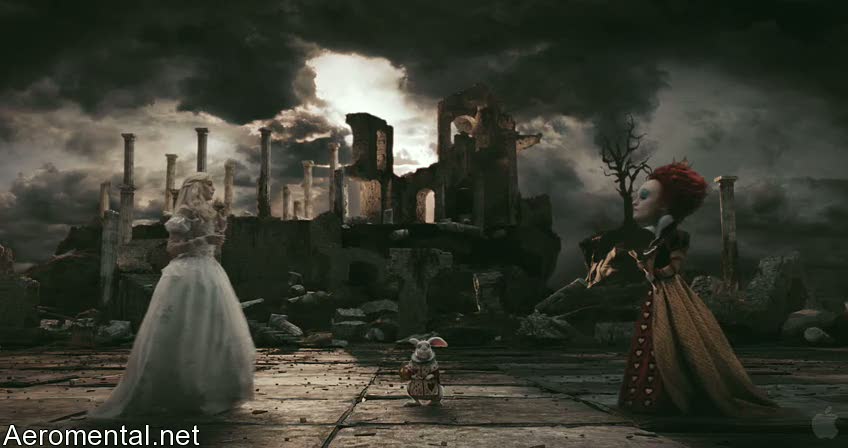 |
| Mia Wasinowski as Alice, all grown up |
A lot of people took issue with Alice in Wonderland, Burton's almost-trippy adaptation. I realized ten minutes into the film that the title was inaccurate. Burton wasn't putting his own spin on Alice; his characters and setting were lifted from the pages of Through the Looking Glass. And the story line was 100% his own -- unlike Sleepy Hollow, where he chose to take a famous story and add a little filler here and there to flesh it out, Burton took the characters and setting of a children's classic, and wrote his own sequel, daring to ask the question "And what happened next?"
Alice in Wonderland takes place thirteen years after the original stories left off. Alice, now a disillusioned 19-year-old, has spent the better part of the last decade convincing herself that everything she experienced as a child was nothing more than a dream. She chafes at the modern society she is being indoctrinated into, and realizes that, should she choose to accept the proposal of her suitor, she will have to give up the very things that make her Alice -- her imagination, her curiosity, and her fantasies. In a blind panic, Alice runs away -- and falls right down the rabbit hole again.
Wonderland (or Underland, as she discovers it really is called) has been thrown into upheaval. Where once, the Red Queen Irasabeth (Bonham-Carter) and the White Queen Mirana (Anne Hathaway) ruled in harmony, the jealous and ill-tempered Red Queen has now banished her younger sister and taken over all of Underland. The other creatures of Underland -- the White Rabbit, the Mad Hatter, the March Hare, and the Dormouse -- back the White Queen, and wait in hopes of the Alice, their prophesized savior, to return to defeat the Red Queen and restore peace. Alice, now merely a shadow of her former self, is faced with the difficult task of admitting to herself that her "childhood dreams" were not merely fantasy, and must find a way to win the White Queen her throne back.
I didn't expect to like this movie, but I really did, for a number of reasons.
- I was happy that Tim Burton didn't try to do a spin on the original Alice and just make it weird. I loved the original story, the "what-ifs", the idea that the beautiful fantasy world went on and grew wild in Alice's absence. Surely the backwards living ideas of Lewis Carroll's Wonderland and Looking Glass Land didn't bode well for adequate government. It would really only be a matter of time before the fairy tale creatures rose in anarchy against each other.
- NEW leading characters. True, Johnny Depp and Helena Bonham Carter were in it, and in large roles, but they weren't THE stars of the film. Probably my favorite character was Anne Hathaway as the White Queen. She's beautiful and fragile and delicate, but as the film goes on, you see the streak of inner sadism that is very much alive within her. The confrontation between Queens Red and White is extremely dramatic, leaving you wondering, in the end, who the real enemy was all along.
 |
| The White Queen (Anne Hathaway) and the Red Queen (Helena Bonham Carter) meet on the field of battle at last. |
- The cinematography, of course, is beautiful, but that's something one comes to expect from Tim Burton.
For someone who really does bristle when film tries to reproduce literature and ends up completely bastardizing it, I like this movie a lot, and I suppose that's surprising. But I don't feel that it rapes Carroll's original vision. Carroll began Alice's story, Tim Burton creates his own spin on what would have happened after Alice grew up. And considering that Carroll's Alice spends a great deal of time attempting to grow up, I think he would have enjoyed Burton's theory that she would grow up, and yet be unable to separate from the magic of her childhood completely. Alice can never fully relinquish her childhood, any more than the rest of us can.
No comments:
Post a Comment